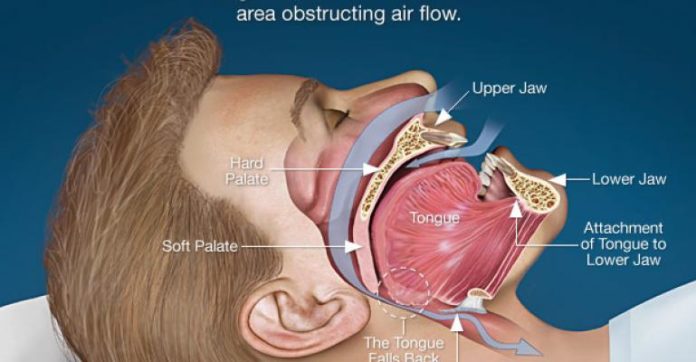It is common knowledge that human beings need about 7 to 8 hours of sleep — and not just to feel good or to do away with those under-eye circles but also for overall health.
Sound sleep benefits the heart, weight, mind, and body.
It helps in repairing damaged cells and the immune system, handling daily wear and tear, and recharging our system.
Unhealthy food habits, lack of exercise, and irregular and varying working styles are all conditions that can hamper sleep.
‘Apart from this, there are those who suffer from what are called sleep disorders.
‘It is alarming to note that not many people take these disorders seriously and are, therefore, also prone to other health conditions such as obesity, hypertension and diabetes
Sleep Apnea, its types, and symptoms
Sleep apnea is a serious condition in which a person’s breathing starts and stops repeatedly while they are asleep.
It is further divided into three types:
- Obstructive sleep apnea is a condition where the airway repeatedly becomes blocked, limiting the amount of air reaching the lungs. People with this condition snore loudly or make choking noises while breathing. It leads to oxygen deprivation in the brain and body and the person may wake up.
- Central sleep apnea occurs when the brain doesn’t send proper signals to the muscles that control breathing.
- Complex sleep apnea syndrome or treatment-emergent central sleep apnea occurs when a person has both obstructive and central sleep apnea.
Some of the symptoms common to all the above forms include loud snoring (most prominent sign), episodes of breathing cessation during sleep, waking up abruptly with shortness of breath, waking up with a dry mouth or sore throat, morning headache, insomnia, daytime sleepiness or grogginess, attention issues, and irritability.
Risk factors and complications
Although anyone irrespective of age can get sleep apnea, there are certain factors that increase the likelihood of acquiring this condition.
Some of these include sex (it is more common in males due to their anatomy), excess weight, family history of the condition, narrowed airway or an anatomical defect, menopause, pregnancy, smoking and drinking, posture, and certain medications.
It is important to consult a specialist if any of the characteristic symptoms of sleep apnea are present or if you fall under any of the risk factors for the condition.
In the absence of timely diagnosis and treatment, sleep apnea can also lead to death.
This is because a person’s heartbeat becomes irregular during an apneic episode causing a rise in blood pressure.
In people who are overweight, it increases the chances of developing diabetes and high cholesterol later in life. Besides this, sleep apnea can also cause day-time accidents, due to grogginess.
Diagnosis and management
Sleep apnea is diagnosed with the help of a sleep study called nocturnal polysomnography, done in an overnight sleep laboratory.
This process records brain waves, eye and leg movements, oxygen levels, airflow, and heart rhythm during sleep.
At times, a CPAP (Continuous Positive Airway Pressure) machine is recommended, which consists of an air blower that continuously blows air through the nose or mouth.
The air pressure helps in preventing collapse of the upper airway tissues during sleep. Other options include certain oral devices and surgery.
Certain lifestyle changes can help avoid the onset of this condition or provide relief from existing symptoms.
- Lose excess weight as this is a major contributing factor for sleep apnea — even a 10 per cent weight loss is helpful.
- Avoid smoking and drinking. Do not consume sleeping pills. All of these can cause the airways to collapse during sleep and lengthen the time you are unable to breathe well.
- Avoid sleeping on your back; sleep to one side instead.
- Nasal sprays are best avoided as these can aggravate any sinus problems or congestion, making sleeping difficult.
Sleep apnea is a serious disorder and can affect the health and quality of life of an individual, which makes it imperative to get diagnosed and treated on time.



















































